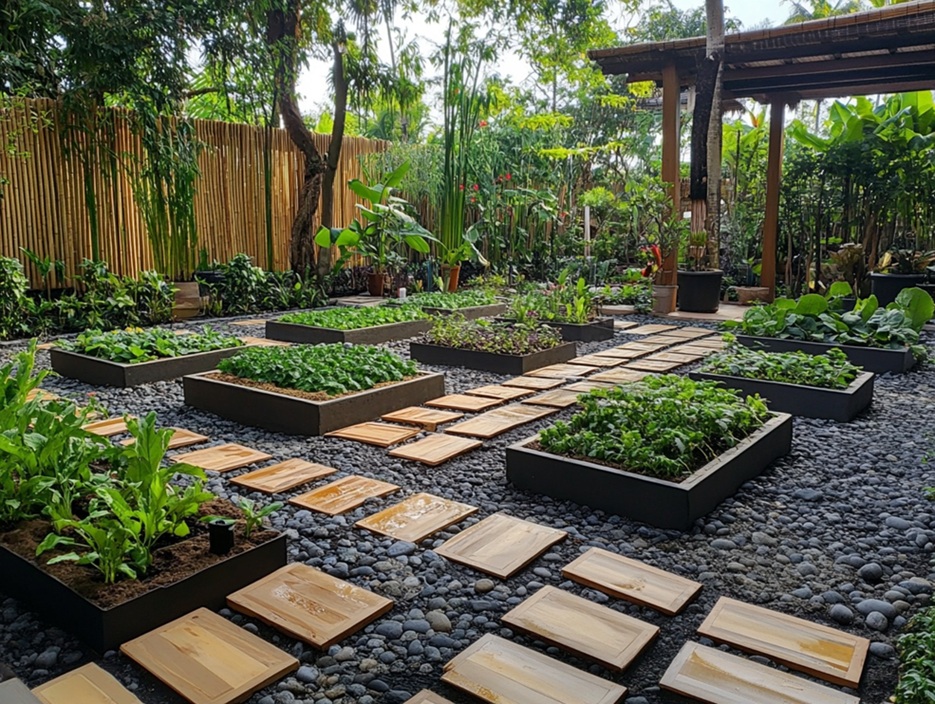Creating Harmony and Balance in Your Vegetable Plot
Applying Feng Shui principles to your garden can transform it into a space of harmony and balance that supports not just the growth of plants, but also the well-being of those who tend to it. Rooted in ancient Chinese philosophy, Feng Shui emphasizes the flow of energy, or “chi,” to create harmonious environments. By aligning your vegetable garden with these principles, you can enhance its vitality and your overall gardening experience.
The Basics of Feng Shui for Gardens
Feng Shui is more than just an aesthetic approach; it’s a way of organizing spaces to optimize the flow of energy. In a garden, this means designing your layout to balance natural elements, promote positive energy, and minimize areas where energy can stagnate.
Key Principles of Feng Shui
- Balance of the Five Elements: Incorporate the five essential elements of Feng Shui—wood, fire, earth, metal, and water—to create a garden that feels complete and vibrant.
- Flow of Chi: Ensure that pathways and garden beds allow for the free movement of chi, avoiding straight lines and sharp corners that can disrupt the energy flow.
- Yin and Yang Balance: Create contrasts of light and dark, soft and hard surfaces, and other complementary elements to promote harmony.
Understanding these principles can help you apply Feng Shui to your vegetable garden effectively.
Choosing the Best Location for Your Vegetable Garden
The placement of your garden is a fundamental aspect of Feng Shui. A well-situated garden ensures that energy flows smoothly and nurtures both the plants and the gardener.
Optimal Garden Placement
- East or Southeast Orientation: Gardens facing the east or southeast benefit from the nurturing energy of the rising sun, associated with growth and renewal.
- Avoiding Shadowed Areas: While some vegetables can grow in shade, a garden that is overly shaded can lead to stagnant chi. Balance shade with sun to keep the energy lively.
Entryways and Paths
The pathways leading to and within your garden are crucial for guiding chi:
- Curved Paths: Use winding paths rather than straight ones to allow chi to move gently through the space.
- Clear Entrances: Keep the entrance to your garden clear of clutter to invite positive energy.
Balancing the Five Elements in Your Garden Design
To maximize the Feng Shui of your garden, incorporate each of the five elements in thoughtful ways:
Wood Element
Wood represents growth and vitality, making it an essential part of any garden:
- Plant Choice: Include a variety of leafy greens and tall vegetables, such as corn and kale, which symbolize the wood element.
- Garden Structures: Wooden trellises or raised beds can also introduce this element.
Fire Element
The fire element brings passion and warmth:
- Bright Flowers: Plant marigolds or nasturtiums to add vibrant colors that symbolize fire.
- Garden Lighting: Use warm-colored solar lights or lanterns to keep the energy active after sunset.
Earth Element
The earth element stabilizes and grounds your garden:
- Stone Pathways: Incorporate stone walkways or a rock garden to anchor the space.
- Clay Pots: Use terracotta containers to add the earthy element to your garden.
Metal Element
Metal enhances clarity and helps structure the energy flow:
- Decorative Items: Place small metal garden ornaments or wind chimes to invite good energy.
- Raised Beds: Use metal borders or galvanized steel planters for a modern touch.
Water Element
Water symbolizes prosperity and emotional health:
- Water Features: Add a small water fountain or birdbath to create a soothing sound and attract wildlife.
- Irrigation: Ensure water flows smoothly without pooling, which can create stagnant energy.
Best Plants for a Feng Shui Vegetable Garden
Choosing the right vegetables can support the harmonious energy in your garden. Here are some Feng Shui-friendly vegetable choices:
Leafy Greens and Herbs
Leafy vegetables like spinach, kale, and herbs like basil and mint are excellent for promoting growth and good health. Their lush green color also represents the wood element, fostering vibrancy and new beginnings.
Root Vegetables
Root vegetables such as carrots, beets, and radishes embody the earth element. They ground your garden both literally and figuratively, bringing stability and balance.
Colorful Crops
Incorporate vegetables with bright colors, such as tomatoes and peppers, to bring in the fire element. These crops add energy and dynamism, contributing to a lively garden atmosphere.
Arranging Your Garden for Maximum Chi Flow
The layout of your garden can influence how energy moves through it. Here’s how to arrange your Feng Shui vegetable garden for optimal energy flow:
Create Natural Flow with Paths and Beds
Design your garden with pathways that encourage meandering. Avoid straight, harsh lines in favor of curves that allow energy to circulate freely.
- Raised Beds: Elevate certain sections to create visual interest and varied energy levels.
- Spaced Planting: Give each plant adequate space to thrive, which also helps chi move around them.
Add Vertical Elements
Vertical gardening with trellises or tall plants like beans and cucumbers can introduce the wood element and guide chi upward, creating a sense of expansion and movement.
Soften Boundaries
While clear edges help define the space, too many hard lines can block energy. Soften boundaries with low hedges, flowering plants, or decorative grasses.
Enhancing Your Garden’s Energy with Accessories
Integrating garden accessories is another way to align with Feng Shui principles. Choose items that promote positive energy and aesthetic harmony.
Water Features and Birdbaths
Adding a small water feature can be transformative. Not only does it bring in the water element, which symbolizes abundance, but it also attracts birds and beneficial insects, enhancing biodiversity.
- Placement Tip: Place water features in the southeast corner to amplify the energy of prosperity.
Wind Chimes and Garden Ornaments
Wind chimes made of metal can activate stagnant areas of your garden, creating a gentle sound that promotes the flow of chi.
- Use Sparingly: Too many accessories can clutter the space and disrupt the natural flow of energy.
Benches and Seating
Create a space for rest and contemplation by adding a bench or small seating area. This encourages you to connect with your garden and absorb its harmonious energy.
Additional Feng Shui Tips for Your Garden
Enhancing the Feng Shui of your garden involves continuous attention to detail. Here are some additional tips to keep your garden balanced:
Keep Your Garden Clean and Tidy
A cluttered garden can trap chi and prevent it from flowing properly. Regularly remove dead plants, fallen leaves, and other debris.
Use Reflective Surfaces Wisely
Mirrors and other reflective surfaces can be used to redirect chi but should be placed carefully to avoid reflecting energy back out of the garden.
Promote Wildlife
Attract beneficial wildlife, such as birds and bees, to bring life and movement, enhancing the chi in your garden. Pollinator-friendly plants like lavender and borage can help.
For more on how to attract wildlife, check out our guide on “Attracting Pollinators to Your Vegetable Garden”.


Leave a Reply